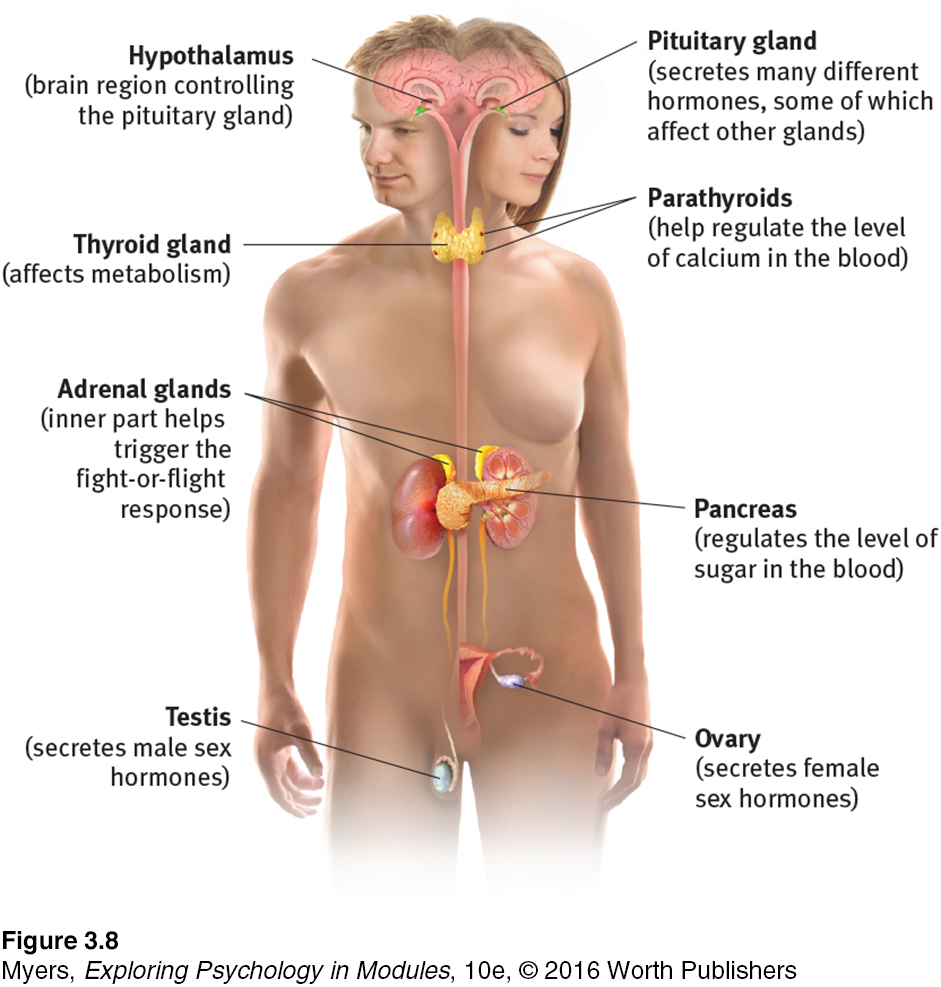3.3 The Endocrine System
3-
endocrine [EN-
hormones chemical messengers that are manufactured by the endocrine glands, travel through the bloodstream, and affect other tissues.
So far, we have focused on the body’s speedy electrochemical information system. Interconnected with your nervous system is a second communication system, the endocrine system (FIGURE 3.8 below). The endocrine system’s glands secrete another form of chemical messengers, hormones, which travel through the bloodstream and affect other tissues, including the brain. When hormones act on the brain, they influence our interest in sex, food, and aggression.
Some hormones are chemically identical to neurotransmitters (the chemical messengers that diffuse across a synapse and excite or inhibit an adjacent neuron). The endocrine system and nervous system are therefore close relatives: Both produce molecules that act on receptors elsewhere. Like many relatives, they also differ. The speedy nervous system zips messages from eyes to brain to hand in a fraction of a second. Endocrine messages trudge along in the bloodstream, taking several seconds or more to travel from the gland to the target tissue. If the nervous system transmits information with text-
46

Endocrine messages tend to outlast the effects of neural messages. That helps explain why upset feelings may linger beyond our awareness of what upset us. When this happens, it takes time for us to “simmer down.”
adrenal [ah-
In a moment of danger, for example, the ANS orders the adrenal glands on top of the kidneys to release epinephrine and norepinephrine (also called adrenaline and noradrenaline). These hormones increase heart rate, blood pressure, and blood sugar, providing a surge of energy. When the emergency passes, the hormones—
pituitary gland the endocrine system’s most influential gland. Under the influence of the hypothalamus, the pituitary regulates growth and controls other endocrine glands.
The most influential endocrine gland is the pituitary gland, a pea-
Pituitary secretions also direct other endocrine glands to release their hormones. The pituitary, then, is a master gland (whose own master is the hypothalamus). For example, under the brain’s influence, the pituitary triggers your sex glands to release sex hormones. These in turn influence your brain and behavior (Goetz et al., 2014).
This feedback system (brain → pituitary → other glands → hormones → body and brain) reveals the intimate connection of the nervous and endocrine systems. The nervous system directs endocrine secretions, which then affect the nervous system. Conducting and coordinating this whole electrochemical orchestra is that maestro we call the brain.